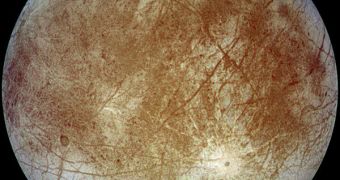Named after a mythical Phoenician noblewoman, Jupiter's sixth moon, Europa, may be among the safest bets in the solar system, in terms of having the ability to sustain life as we know it, astronomers have recently announced. In the investigations, the experts determined that the massive ocean of liquid water that was flowing underneath the moon's crust might have sufficient amounts of oxygen to allow for the basic processes related to primordial life to take place, Space reports.
In spite of promising results obtained through observations of other celestial bodies in the solar system, such as the moon Enceladus, Europa has always remained the best bet for finding life on another celestial body except the Earth. Its ocean is estimated to flow several miles beneath its crust, but scientists argue that it may be sufficiently developed to allow for basic microorganisms to exist. Naturally, organisms powered by exotic chemical reactions involving sulfur and methane are possible, but highly unlikely.
Because the moon is completely covered in oceans, its volume of water may, in fact, be twice as large as that of all our planet's oceans combined. It may be that oxygen forms underground due to large-scale interactions between the water molecules and high-energy photons emanating from the Sun. Ensuing chemical reactions could result in other types of elementary particles and in oxygen, planetary scientists believe. Another peculiarity that Europa has is the fact that its surface is only 50 million years old, which is very little by geological standards. The surface is also in a constant state of renewal.
University of Arizona in Tucson (UAT) expert Richard Greenberg spent a large amount of time studying the surface of Jupiter's satellite, in an attempt to determine whether oxygen indeed existed and in what concentrations. Using estimative models, he determined that the rate of oxygenation in Europa's underground could exceed that of the Earth's waters within only a few million years, He also determined that oxygen concentrations might already be sufficiently large to allow for the existence of more complex lifeforms than bacteria.

 14 DAY TRIAL //
14 DAY TRIAL //